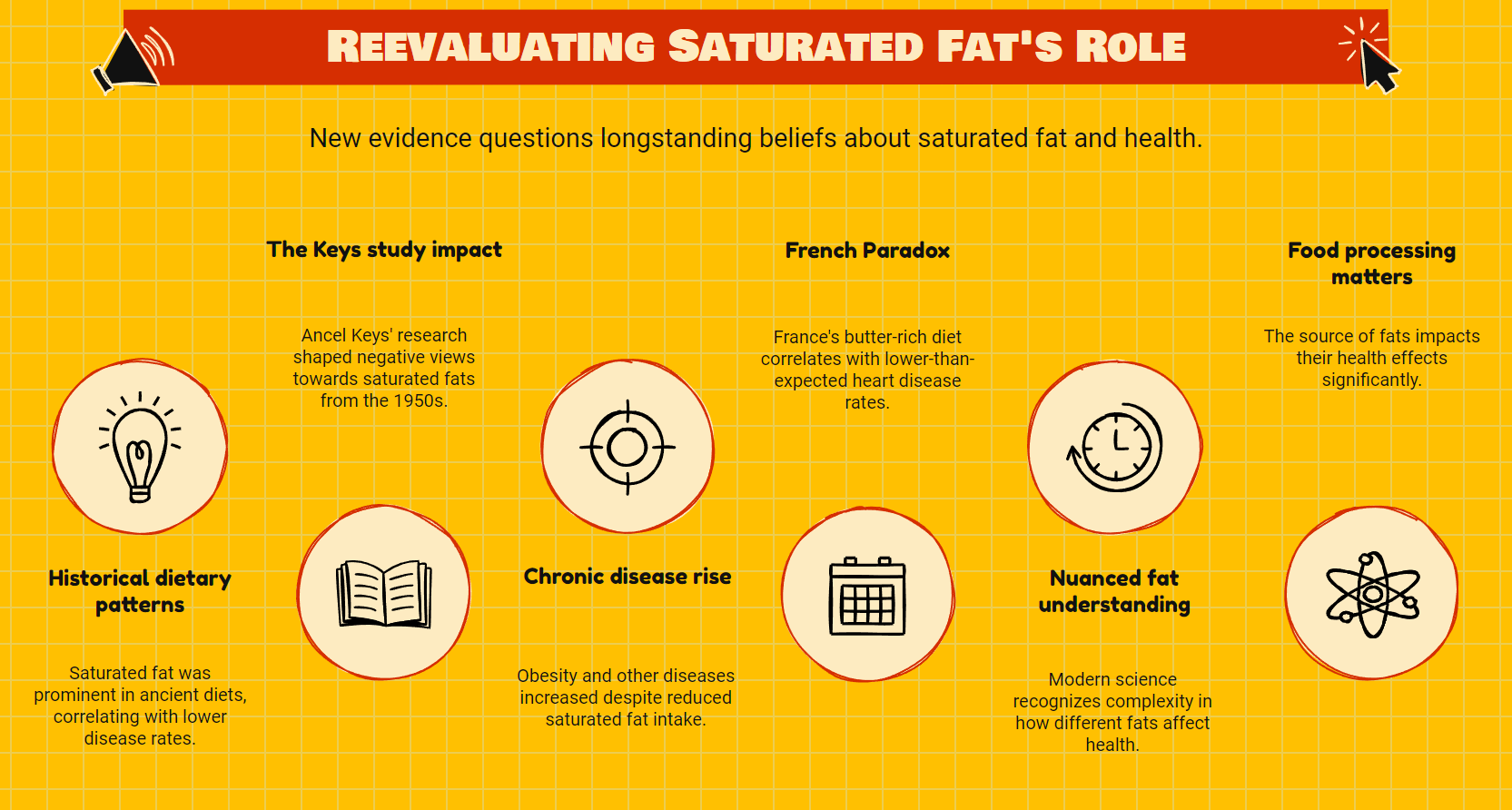
Fat Was Never The Villain
Fat Was Never The Villain
Butter makes us sick. Bacon causes heart attacks. Cheese clogs arteries.
These beliefs have dominated nutrition advice for decades. But what if everything we thought we knew about saturated fat was built on a foundation of sand?
A comprehensive analysis of health data spanning two centuries suggests something remarkable. As saturated fat consumption has decreased in Western diets over the past 50 years, rates of chronic disease have paradoxically increased. This inverse relationship challenges core assumptions that have guided dietary recommendations since the 1970s.
How We Came to Fear Fat
The vilification of saturated fat began in earnest with Ancel Keys and his Seven Countries Study in the 1950s. Keys found correlations between saturated fat intake and heart disease in select countries. His work eventually formed the backbone of dietary guidelines that advised Americans to reduce fat consumption, particularly saturated fat.
What followed was predictable. Food manufacturers reformulated products to be "low-fat" while often increasing sugar content. Vegetable oils replaced animal fats, and margarine substituted for butter. And the public dutifully reduced consumption of foods like eggs, meat, and full-fat dairy.
During this same period, rates of obesity, diabetes, heart disease, and other chronic conditions climbed steadily upward. Correlation isn't causation, but the timing raises questions worth exploring.
What the Historical Data Reveals
The 200-year analysis presents a compelling narrative. Before the 20th century, Western diets contained significantly more saturated fat from butter, lard, tallow, and fatty meats. Yet heart disease was sporadic. The first clinical description of a heart attack wasn't published until 1912.
Chronic disease rates accelerated as the 20th century progressed and industrial seed oils and processed carbohydrates replaced traditional fats. The data suggests that populations consuming higher amounts of natural saturated fats historically showed lower rates of diseases that these fats were supposed to cause.
Perhaps most striking is what happened in countries that resisted the low-fat paradigm. With its butter-rich cuisine, France has maintained lower heart disease rates than would be predicted by saturated fat consumption alone, a phenomenon dubbed the "French Paradox." Similar patterns appear in traditional Mediterranean diets that embrace fat-rich foods like olive oil.
Beyond Correlation
The historical inverse relationship between saturated fat consumption and chronic disease doesn't prove causation. Factors influencing population health include physical activity, smoking rates, stress, and overall dietary patterns.
This data does provide reason to question our certainty about saturated fat. Modern nutritional science increasingly recognizes that the body's response to saturated fat is complex and individualized. The type of saturated fat matters, as does the food matrix in which it appears. Genetic factors influence how each person processes different fats.
Recent research supports a more nuanced view. A 2020 analysis in the Journal of the American College of Cardiology found "no beneficial effects of reducing saturated fat intake on cardiovascular disease and total mortality." Multiple meta-analyses have failed to find strong links between saturated fat intake and heart disease when looking at prospective cohort studies.
Rethinking Nutritional Dogma
Science advances through questioning established beliefs. The historical data on saturated fat consumption invites us to reconsider nutritional orthodoxy that has dominated for half a century.
This doesn't mean we should abandon all dietary caution. Context matters enormously. Saturated fat consumed within ultra-processed foods likely has different effects than saturated fat from minimally processed whole foods. The overall dietary pattern and lifestyle remain crucial.
The data does suggest that natural foods containing saturated fat may have been unfairly demonized. For millennia, eggs, full-fat dairy, and unprocessed meat have been part of human diets. Their wholesale removal from diets may have unintended consequences that outweigh theoretical benefits.
Moving Forward With Nuance
The inverse relationship between historical saturated fat consumption and chronic disease rates should prompt humility in nutritional science. Dietary patterns that worked for our ancestors might contain wisdom that our modern guidelines have overlooked.
Rather than focusing on single nutrients like saturated fat, a more productive approach might consider food quality, processing methods, and traditional preparation techniques. Historical data suggests that natural fats consumed in whole foods may be neutral or even beneficial for many people.
This perspective doesn't advocate nutritional nihilism, where "anything goes." Instead, it suggests that traditional food wisdom, backed by evolutionary history, deserves respect alongside modern nutritional science.
The Path Forward
Nutritional science continues to evolve. The historical inverse relationship between saturated fat consumption and chronic disease doesn't end the conversation, but should enrich it.
For individuals, this might mean questioning blanket restrictions on natural saturated fats while considering personal health markers, genetic factors, and overall dietary patterns. For policymakers, it suggests caution in issuing population-wide guidelines based on incomplete evidence.
The most important lesson may be intellectual humility. When two centuries of data challenge our assumptions, we have a scientific obligation to reconsider them. The human body is more complex than any nutritional theory can fully capture.
Perhaps butter wasn't the villain after all. And recognizing this might be the first step toward nutritional wisdom that better serves human health.
